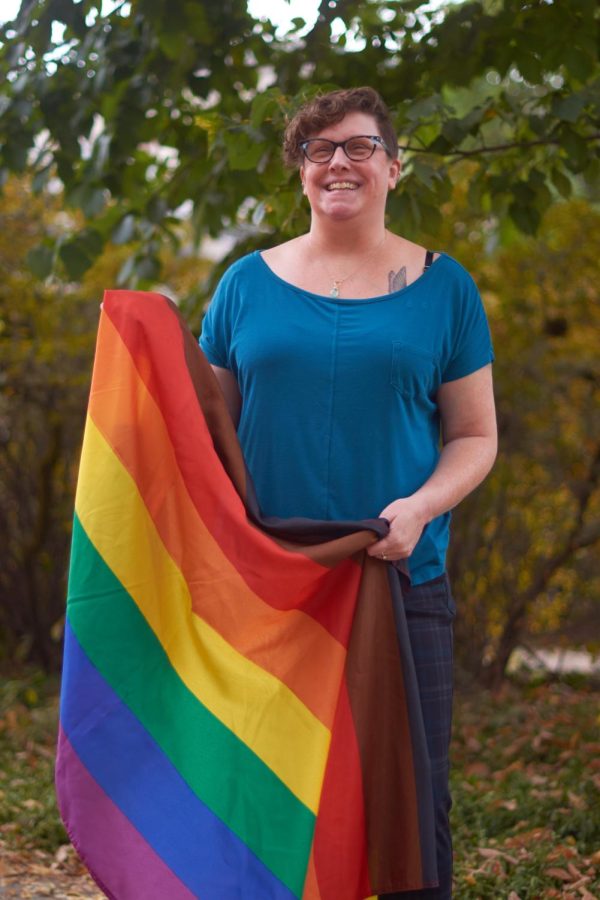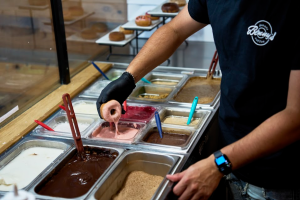Q&A with Pride Center Director Cindy Konrad
By Alex Ozeran, OMN Photographer
Pride Center Director Cindy Konrad posing with a Philadelphia pride flag on the OSU campus on Oct. 20, 2022. Konrad began working with Pride Centers at the University of Wisconsin- Whitewater before coming to OSU.
November 3, 2022
Q: What is your name and what are your pronouns if you are comfortable stating?
A: Cindy Konrad, and I use she and they pronouns. I’m equally comfortable with both.
Q: What is your official position title? Have you held any other positions here at OSU and if so what were they?
A: I am the Center Director of the Pride Center and SOL: LGBTQ+ Multicultural Support Network. SOL is our network for LGBTQIA2S+ Black, Indigenous and students of color in Diversity & Cultural Engagement.
Q: How did you get involved with Oregon State University and the Pride Center?
A: I began doing Pride Center work at the University of Wisconsin-Whitewater. When I came to OSU to interview for the position here, I was impressed with the students I met. They were so thoughtful, they were willing to ask tough questions and they were so passionate about what the LGBTQIA2S+ community could be. I thought, yes. These are people I want to work with.
Q: What does your job consist of? What kinds of things do you do daily at the Pride Center?
A: Working in a Cultural Resource Center involves a bit of everything. I help support students who need resources or who are struggling, I supervise and mentor the SOL and Pride student staff members, I help the staff put on programming and find resources for our community, and I learn about the needs of LGBTQIA2S+ and questioning students.
I also work outside of the center as a thought partner to people all over campus who are trying to make campus a more affirming place, and I serve on committees that address issues important to the LGBTQIA2S+ community. I also work with the LGBTQ+ Council of student groups, oversee the SOL and Pride budgets, and manage the Pride Center building.
Q: What is the best part about working at the Pride Center?
A: The best part of working with the SOL and the Pride Center is seeing students grow. I’ve gotten to know so many people who have just arrived on campus and then see how they become more themselves and more confident in their voices. It is wonderful to witness.
Q: How long have you been working at the Pride Center?
A: I celebrated my seven-year work anniversary on Sept. 1, 2022.
Q: What is something you are looking forward to here at the Pride Center?
A: Our center has a history of being student-founded and run, and that is an ethos we try hard to keep in Diversity and Cultural Engagement. Professional staff are in the centers to offer support, guidance and take some of the weight of the work off of student leaders. Every year I look forward to seeing how students lead the work of the center. I also am looking forward to seeing the plans for our renovation come to life. That project has been in the planning stages for almost 20 years, and now it’s going to become a reality.
Q: What has it been like working at the Pride Center?
A: Working at the Pride Center has been the best professional adventure so far in my career. I am challenged in the absolutely best way by students and my coworkers in DCE, and I have learned and grown so much in the past seven years. I am in awe of the work that years of students have done to make SOL and the Pride Center a reality and to keep doing such important work. To be able to have a part in that work is an incredible honor.
Q: How has working there and meeting new people every day changed you from when you first started working?
A: During my time at OSU, I’ve seen lots of things that student and staff advocates on campus have worked for come to life. Things like the Pride Floor and the identity-focused counselor positions in CAPS.
Q: Do you think you’ve learned or gained anything from working at the Pride Center?
A: I’ve learned so much about the communities served by the cultural resource centers, including my own. I’ve gotten to meet so many people, hear their stories, their histories and learn about what is important to them. I am grateful to have these opportunities.






